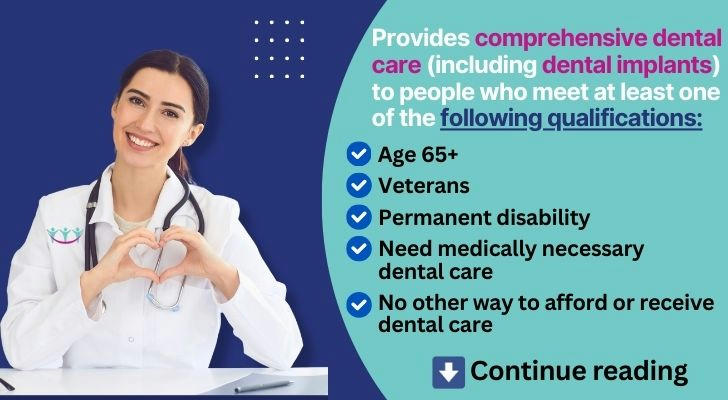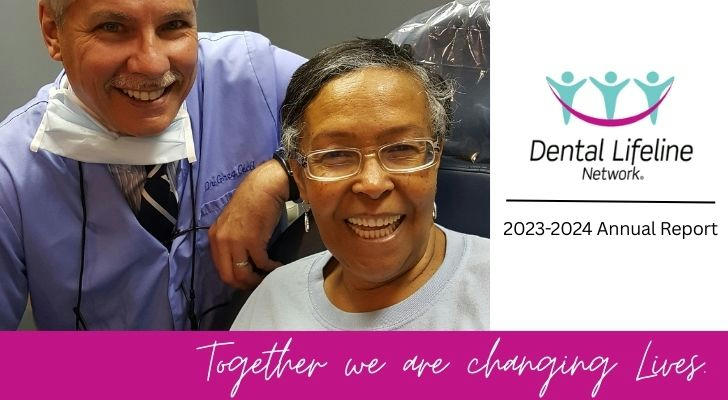Donated Dental Services | Who Qualifies & How to Apply
DDS Program: Provides Comprehensive Dental Care, Including Dental Implants
Quality dental care remains out of reach for many, especially seniors, individuals with disabilities, veterans, and those with limited financial resources. The Donated Dental Services (DDS) program, administered by the Dental Lifeline Network, addresses this need by providing comprehensive dental care, including dental implants, to eligible candidates who are 65 or older, have a permanent disability, require medically necessary dental care, are veterans, or have no other viable means of affording dental care.
If you believe you might qualify for the DDS program, this article will serve as your guide. We'll detail the qualification requirements and the application process, empowering you to take the necessary steps toward better oral health.

Who Qualifies for Donated Dental Services?
The DDS program is designed for individuals who cannot afford dental care and do not qualify for other assistance programs. This includes:
✔ Seniors (65+) who struggle with dental issues and need solutions such as permanent dental implants.
✔ People with disabilities who require specialized dental care but have limited financial means.
✔ Individuals with serious medical conditions who need medically necessary dental care before undergoing treatments like organ transplants or chemotherapy.
✔ Veterans who are not eligible for full dental benefits through the VA.
One of the key benefits of the DDS program is that it provides comprehensive care, not just basic checkups. This means patients can access same-day dental implants, extractions, and even full dental plans with no upfront payments.
The Impact of the DDS Program
Since its inception, the DDS program has provided over $500 million in donated dental treatments to more than 165,000 individuals across the United States. According to the Dental Lifeline Network, In 2023 alone, more than 5,825 patientsreceived comprehensive dental care at no additional cost through a network of 12,718 volunteer dentists and 3,247 dental laboratories. These figures highlight the program’s significant reach and effectiveness in addressing the dental health crisis among vulnerable populations.
How to Apply for Donated Dental Services
Applying for the DDS program involves several steps:
1. Check Eligibility: Visit the Dental Lifeline Network website to review the specific eligibility criteria for your state.
2. Submit an Application: Download and complete the application form, providing details about your income, medical history, and dental needs.
3. Wait for Processing: Due to high demand, applications can take several months to process. Urgent cases may receive priority.
4. Get Matched with a Volunteer Dentist: If approved, you will be connected with a local dentist who provides services at no additional costs. The dentist will assess your case and develop a treatment plan.
5. Schedule Your Appointment: Coordinate directly with the dentist’s office to arrange your appointments.
Real-Life Success Story: Sarah’s Journey
Sarah, a 72-year-old retiree, struggled with severe dental issues but couldn’t afford treatment on her fixed Social Security income. Eating was painful, and she avoided social interactions due to her deteriorating teeth.
After learning about the Donated Dental Services (DDS) program, she applied as a senior without dental insurance. A few months later, she was matched with a local dentist, who determined that dental implants would restore her oral health.
Thanks to the DDS program, Sarah received her implants with no upfront costs. Now, she can eat comfortably and smile confidently, reclaiming her quality of life.

Important Considerations
✔ Limited Availability: Due to high demand, not all applicants receive immediate care. Some may be placed on a waiting list.
✔ Possible Small Fees: While most treatments are covered, there may be a minimal, one-time fee to cover administrative costs.
✔ Not All Services Are Covered: The availability of specific treatments, such as dental implants, depends on the discretion of the volunteer dentist and available resources.
Despite these limitations, the DDS program remains an economically viable resource for individuals who would otherwise lack access to essential dental care.
If you or someone you know needs affordable dental services, the DDS program offers a practical and effective solution. Take the first step today by visiting the Dental Lifeline Network website and applying for Donated Dental Services.
A healthy smile may be closer than you think!
If you like this article, please share it with someone in need. Thank you for reading and I wish you a happy life!
Source of relevant information of the article:
